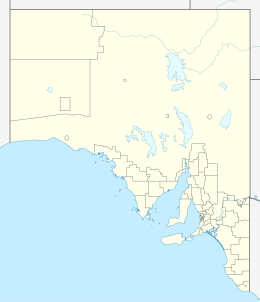Liguanea Island
Liguanea Island
Jump to navigation
Jump to search
 Liguanea Island | |
| Geography | |
|---|---|
| Location | Great Australian Bight |
| Administration | |
Australia | |
Liguanea Island is an uninhabited granite island located 3.7 km south of Cape Carnot at the southern, central point of Eyre Peninsula, South Australia. It is approximately 2.7 km long, 180 ha in size its elevation above sea level is estimated to be 43 metres.[1] It is approximately 35 km south-west of Port Lincoln in the Great Australian Bight.[2] The island forms part of the Lincoln National Park.[3]
History[edit]
Liguanea Island was named by British explorer Matthew Flinders on 18 February 1802. The following day, Flinders named the nearby headland Cape Wiles "after a worthy friend at Liguanea, in Jamaica." In Flinders' atlas (Plate 17) there is a view of the cape and the island as seen from his ship, The Investigator.[4]
The same year, French explorer Nicolas Baudin named the island as Ile Guyton.[4]
In 1905, the ship Governor Musgrave called by Liguanea Island while searching for the wreckage of the lost vessel, Loch Vennachar. A newspaper correspondent on the vessel described the island as "a large bare block of forbidding granite some miles in extent."[5]
In 1914, a buck and two does were placed on Liguanea Island.[6]
The island first obtained protected area status as a fauna conservation reserve declared under the Crown Lands Act 1929-1966 on 16 March 1967.[7]
On 26 May 1980 biodiversity data was collected on Liguanea Island. Among there species recorded were Australian sea-lion, little penguin, Cape Barren goose and bush rat.[8]
References[edit]
^ Liguanea Island Geoview.info Accessed 2014-01-10.
^ Property Location Browser V2 Government of South Australia. Accessed 2014-01-10.
^ "Lincoln National Park Management Plan". Department of Environment Water and Natural Resources. 2004. p. 2. Retrieved 26 January 2014..mw-parser-output cite.citation{font-style:inherit}.mw-parser-output .citation q{quotes:"""""""'""'"}.mw-parser-output .citation .cs1-lock-free a{background:url("//upload.wikimedia.org/wikipedia/commons/thumb/6/65/Lock-green.svg/9px-Lock-green.svg.png")no-repeat;background-position:right .1em center}.mw-parser-output .citation .cs1-lock-limited a,.mw-parser-output .citation .cs1-lock-registration a{background:url("//upload.wikimedia.org/wikipedia/commons/thumb/d/d6/Lock-gray-alt-2.svg/9px-Lock-gray-alt-2.svg.png")no-repeat;background-position:right .1em center}.mw-parser-output .citation .cs1-lock-subscription a{background:url("//upload.wikimedia.org/wikipedia/commons/thumb/a/aa/Lock-red-alt-2.svg/9px-Lock-red-alt-2.svg.png")no-repeat;background-position:right .1em center}.mw-parser-output .cs1-subscription,.mw-parser-output .cs1-registration{color:#555}.mw-parser-output .cs1-subscription span,.mw-parser-output .cs1-registration span{border-bottom:1px dotted;cursor:help}.mw-parser-output .cs1-ws-icon a{background:url("//upload.wikimedia.org/wikipedia/commons/thumb/4/4c/Wikisource-logo.svg/12px-Wikisource-logo.svg.png")no-repeat;background-position:right .1em center}.mw-parser-output code.cs1-code{color:inherit;background:inherit;border:inherit;padding:inherit}.mw-parser-output .cs1-hidden-error{display:none;font-size:100%}.mw-parser-output .cs1-visible-error{font-size:100%}.mw-parser-output .cs1-maint{display:none;color:#33aa33;margin-left:0.3em}.mw-parser-output .cs1-subscription,.mw-parser-output .cs1-registration,.mw-parser-output .cs1-format{font-size:95%}.mw-parser-output .cs1-kern-left,.mw-parser-output .cs1-kern-wl-left{padding-left:0.2em}.mw-parser-output .cs1-kern-right,.mw-parser-output .cs1-kern-wl-right{padding-right:0.2em}
^ ab "Historical Review of Western Coastline" Port Lincoln Times (1934-06-15). Retrieved 2014-01-10.
^ "Search for the Loch Vennachar. Return of the Governor Musgrave." Chronicle, South Australia (1905-09-30). Retrieved 2014-01-10.
^ "Unattended Coast Lights. New West Coast Lamps." The Advertiser (1914-06-12). Retrieved 2014-01-10.
^ "CROWN LANDS ACT, 1929-1966: FAUNA CONSERVATION RESERVES DEDICATED" (PDF). THE SOUTH AUSTRALIAN GOVERNMENT GAZETTE. Government of South Australia. 16 March 1967. pp. 961–962. Retrieved 5 February 2018.
^ Explore by location > Liguanea Island Atlas of Living Australia. Accessed 2014-01-10.
Coordinates: 34°59′20″S 135°37′17″E / 34.98889°S 135.62139°E / -34.98889; 135.62139
Categories:
- Islands of South Australia
- Great Australian Bight
- Eyre Peninsula
- Uninhabited islands of Australia
(window.RLQ=window.RLQ||).push(function(){mw.config.set({"wgPageParseReport":{"limitreport":{"cputime":"0.336","walltime":"0.426","ppvisitednodes":{"value":2463,"limit":1000000},"ppgeneratednodes":{"value":0,"limit":1500000},"postexpandincludesize":{"value":96125,"limit":2097152},"templateargumentsize":{"value":333,"limit":2097152},"expansiondepth":{"value":14,"limit":40},"expensivefunctioncount":{"value":1,"limit":500},"unstrip-depth":{"value":1,"limit":20},"unstrip-size":{"value":8826,"limit":5000000},"entityaccesscount":{"value":1,"limit":400},"timingprofile":["100.00% 317.572 1 -total"," 48.83% 155.058 1 Template:Infobox_islands"," 34.88% 110.770 1 Template:Infobox"," 26.13% 82.997 1 Template:Reflist"," 22.66% 71.966 9 Template:Navbox"," 22.04% 70.002 2 Template:Cite_web"," 10.94% 34.741 1 Template:Islands_of_South_Australia"," 10.78% 34.229 1 Template:Location_map"," 8.46% 26.855 1 Template:Eyre_Peninsula"," 3.86% 12.264 2 Template:Icon"]},"scribunto":{"limitreport-timeusage":{"value":"0.125","limit":"10.000"},"limitreport-memusage":{"value":3854793,"limit":52428800}},"cachereport":{"origin":"mw1280","timestamp":"20190410015924","ttl":2592000,"transientcontent":false}}});mw.config.set({"wgBackendResponseTime":86,"wgHostname":"mw1270"});});